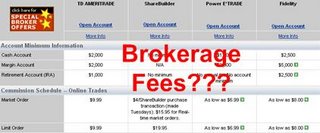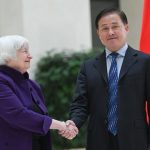Unless you’re big-time investors who buy in millions of dollars in a trade of which the brokerage fees is negligible, you should re-consider the amount of brokerage fees charged on your transaction.
Brokerages such as Merrill Lynch (NYSE:
MER), UBS (NYSE: UBS), Morgan Stanley (NYSE: MS), and Citigroup’s Smith Barney charge quite a sum for stock trades compare to their low-cost competitors which offer many of the same services.For example, according to a Bloomberg article, buying  1,000 shares of a stock via telephone with Merrill Lynch can cost at least $120. Compare that with discount brokerages such as Ameritrade (Nasdaq:
1,000 shares of a stock via telephone with Merrill Lynch can cost at least $120. Compare that with discount brokerages such as Ameritrade (Nasdaq:
However trading online can bring down the fees, for example, Merrill was charging as little as $30 per online trade – yet this is still steep compared to other alternatives. So if you’re investing $1,000 in a stock and you pay a $30 commission fee, you’re forking over 3% of that investment’s value.
Before you think of switching to other brokerage, consider the following:
-
Are you getting personalized service from this high-fees brokerage which justifies the cost?
-
Are they providing you with excellent support whenever you get yourself into trading problem?
-
For online-trading, how fast is the execution of your trade once submitted ? It does not serve any purpose if it takes ages for the transaction to be completed / filled.
-
Are you protected from the broker’s Financial Failures?
-
Do you prefer web-based trading or client-based or the flexibility to have both?
Above are just a handful of considerations that an investor / trader should look at from a high-level view. Brokerage fees is the main determine factor which will decide whether your trades is a profitable or loss-trade – especially if your frequency of trade is high. There’re more factors to be considered which FinanceTwitter will highlight in the coming articles.

|
|
December 14th, 2006 by financetwitter
|


|

|

|

|

|

|




























Comments
Add your comment now.
Leave a Reply